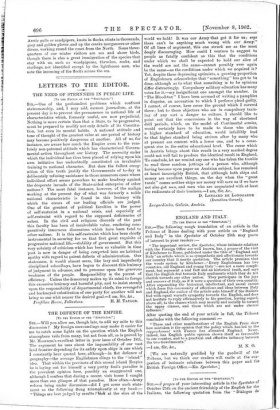THE DEFENCE OF THE EMPIRE.
[To THE EDITOR OF THE " SPECTATOR.".1 Si,—Will you allow me, though late, to add my mite to this discussion ? My foreign surroundings may make it easier for me to catch some lights on the question which the English atmosphere veils from many, but not from all, as is proved by Mr. Moor som's excellent letter in your issue of October 180. The argument be uses about the impossibility of our vast land frontier depending for its safety upon ships is one which I constantly hear quoted here, although—in flat defiance of geography—the average Englishman clings to the " island " idea. That within the precincts of this unreal island Empire he is laying out for himself a very pretty fool's paradise is the prevalent opinion here, possibly an exaggerated one, although I confess that during a recent visit home I caught more than one glimpse of that paradise. How often—Army reform being under discussion—did I get some such state- ment as the following flung trinmphantly at my head:— "Things are best judged by results PMok at the slice of the world we hold! It was our Army that got it for us; ergo' there can't be anything much wrong with our Army.' Of all lines of argument, this one struck me as the most deeply discouraging. How could I venture to suggest to people as fatally confident as this that the conditions under which we shall be expected to hold our slice of the world are not the same—cannot possibly ever again be the same—as the conditions under which we acquired it ? Yet, despite these depressing optimists, a growing proportion of Englishmen acknowledge that "something" has got to be done, although as to what that something is to be opinions differ distractingly. Compulsory military education has many votes for it,—my insignificant one amongst the number. In "The Blood-tax" I have been accused of writing a pamphlet in disguise, an accusation to which I perforce plead guilty. I cannot, of course, here cover the ground which I covered there ; but to those objectors who see in compulsory train- ing of any sort a danger to culture, I should like to point out that the concessions in the way of shortened drill periods, which, on the model of Continental armies, would certainly have to be made to those who attain a higher standard of education, would infallibly lead to that higher standard being striven after by many who at present are content with a lower one, and to a conse- quent rise in the entire educational level. The cause which" in Austria brings about this result in a very marked degree could not well fail to produce the identical result in England. To conclude, let me remind any one who has taken the trouble to read these random jottings of a person who, although having become upon paper an Austrian subject, has remained at heart incorrigibly British, that although both ships and money are excellent things, on the day when the "great tussle" comes neither ships nor money will save us if we have not also got men, and men who are acquainted with at least the rudiments of their business.—I am, Sir, &c., D. LONGARD DE LONGOARDE (Dorothea Gerard).
Longard6wka, Galicia, Austria.










































 Previous page
Previous page